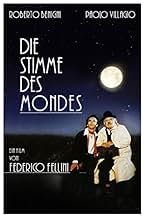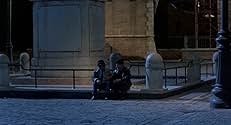NOTE IMDb
6,3/10
3,4 k
MA NOTE
Les aventures amusantes et divertissantes d'un malade mental récemment libéré et de sa bande de marginaux, qui découvrent des conspirations à concourir tout en cherchant l'amour.Les aventures amusantes et divertissantes d'un malade mental récemment libéré et de sa bande de marginaux, qui découvrent des conspirations à concourir tout en cherchant l'amour.Les aventures amusantes et divertissantes d'un malade mental récemment libéré et de sa bande de marginaux, qui découvrent des conspirations à concourir tout en cherchant l'amour.
- Récompenses
- 5 victoires et 9 nominations au total
Histoire
Le saviez-vous
- AnecdotesEven the original (Italian) dialogue was re-dubbed in order to increase the feeling of unreality. However, this is not a unique feature for this particular movie among Fellini's. On the contrary, it was very common for him to ask his performers to speak out loud randomly chosen numbers instead of the actual script text. Then the main cast would re-dub itself, the supporting cast being most of the time re-dubbed by a few specialized actors. It has to be said that in Italy direct sound wasn't much in use until the French 'Nouvelle Vague' made a massive use of it, in the name of realism, and thus became an example for the Italian film industry. Re-dubbing remained nonetheless a common practice, and an excellent one at that until the 1980s, and Fellini took advantage of its possibilities to increase the feeling of unreality in all of his movies by asking his dubbers (all of them) not to perfectly lip-sync. The only exceptions to this technique are his very early works, where the famous dreamlike world and sensitivity of the director aren't still outlined.
- ConnexionsFeatured in Verso la luna con Fellini (1990)
- Bandes originalesThe Way You Make Me Feel
Written & performed by Michael Jackson
Commentaire à la une
Not many directors would choose the end of their career to head off in an entirely new direction, but that is very much what Fellini does here. This was his first film based on a novel (Ermanno Cavazzoni's "Il poema dei lunatici") and quite a radical departure in terms of style.
In a move which apparently alienated many of his traditional audience, the film-world is almost entirely the one experienced by the central characters, Ivo Salvini and to a lesser extent Gonnella. This subjectivity of approach was of course used in "8 1/2" but in a less extreme and clearly autobiographical way. Here, Fellini makes the brave decision to keep contextualisation and explanation to a minimum, leaving the unwary viewer flailing about in search of a foothold. As Ivo's state of mind drifts between lucidity and hallucination, we seldom know what is 'real' and what is imagined, even down to the words spoken by other characters.
"Felliniesque" themes such as the love/fear of women, religious superstition and motifs like madonna statues and mountains of pasta are revisited from this rather skewed perspective, but the film overall has a dislocated feel which is far away from the likes of Roma or Amacord.
Interestingly, Benigni is asked to act here, rather than doing his usual schtick, and does well as a Chaplinesque figure who occasionally reminds one of Guilietta Masina.
This is certainly not what you might call classic Fellini (he confessed to a crisis of confidence writing it) but there is much to enjoy and to wonder at in this last work. The man himself regarded it as the "orphan" of his films and hoped it would come to be better regarded.
Devotees of Terry Gilliam will note the original of the waltz scene lifted for the following year's "Fisher King".
In a move which apparently alienated many of his traditional audience, the film-world is almost entirely the one experienced by the central characters, Ivo Salvini and to a lesser extent Gonnella. This subjectivity of approach was of course used in "8 1/2" but in a less extreme and clearly autobiographical way. Here, Fellini makes the brave decision to keep contextualisation and explanation to a minimum, leaving the unwary viewer flailing about in search of a foothold. As Ivo's state of mind drifts between lucidity and hallucination, we seldom know what is 'real' and what is imagined, even down to the words spoken by other characters.
"Felliniesque" themes such as the love/fear of women, religious superstition and motifs like madonna statues and mountains of pasta are revisited from this rather skewed perspective, but the film overall has a dislocated feel which is far away from the likes of Roma or Amacord.
Interestingly, Benigni is asked to act here, rather than doing his usual schtick, and does well as a Chaplinesque figure who occasionally reminds one of Guilietta Masina.
This is certainly not what you might call classic Fellini (he confessed to a crisis of confidence writing it) but there is much to enjoy and to wonder at in this last work. The man himself regarded it as the "orphan" of his films and hoped it would come to be better regarded.
Devotees of Terry Gilliam will note the original of the waltz scene lifted for the following year's "Fisher King".
- Krustallos
- 26 sept. 2004
- Permalien
Meilleurs choix
Connectez-vous pour évaluer et suivre la liste de favoris afin de recevoir des recommandations personnalisées
- How long is The Voice of the Moon?Alimenté par Alexa
Détails
- Date de sortie
- Pays d’origine
- Langues
- Aussi connu sous le nom de
- The Voice of the Moon
- Lieux de tournage
- Sociétés de production
- Voir plus de crédits d'entreprise sur IMDbPro
Box-office
- Montant brut mondial
- 23 222 $US
- Durée2 heures 6 minutes
- Couleur
- Rapport de forme
- 1.66 : 1
Contribuer à cette page
Suggérer une modification ou ajouter du contenu manquant

Lacune principale
By what name was La voix de la Lune (1990) officially released in India in English?
Répondre


























